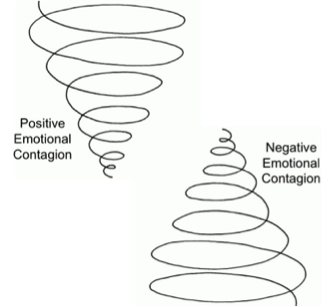Emotional Contagion: The Interview Hack You Never Knew You Needed

Want to be better at job interviews? Here is a nice little hack that can have wide-reaching benefits for you:
You Probably Don’t Realize It, But Your Interviewer Is Nervous, Too
An important thing to be aware of in job interviews – but one that you probably don’t think much about – is the state of the interviewer’s mind. As an interviewee, you have your own angst to deal – but what is going on in the head of your interviewer?
Chances are that they are feeling their own sort of angst. They usually aren’t worried about how they are going to perform – instead, they are worried about you. How are you going to perform? Will you be the right candidate?
These thoughts can put your interviewer in a slightly negative mindset. Add to this the suspicion with which many interviewers naturally approach candidates, and the entire interview atmosphere can turn negative. Your own fearful emotions aren’t going to help here, either.
The most powerful thing you can do, then, is calm your interviewer’s thoughts and put them in a good mood.
But how can you do that? Well, you simply need to create an upward spiral of emotional contagion.
If that sounds scary, don’t worry – I’ll explain exactly what it is and how you can do it.
A Quick Guide to Emotional Contagion
Emotional contagion is a very strong and unconscious process. Because we have evolved to live in social groups, it has been evolutionarily advantageous for human beings to develop the ability to read and react to the emotions of those around us – especially negative emotions.
In our hunter-gatherer days, if one of our kin saw something that could be dangerous and felt fear, it was useful for us to pick up on that fear quickly. Even if we hadn’t seen the danger with our own eyes, we’d be able to protect ourselves.
Consequently, humans have become very good at sensing one another’s emotions – especially the “negative,” survival-related emotions like fear, anger, anxiety, regret, and distrust. In fact, research consistently shows that negative emotions are stronger and far more “contagious” than positive emotions, meaning we have a much easier time picking up on other people’s negative feelings than we do discerning their positive feelings.

What Does This Have to Do With Job Interviews?
It means that your interviewers will very quickly sense any negative emotions you feel during the interview. This is not what you want.
People are often subject to confirmation bias, which drives them to see and hear what they expect to see and hear. In other words, if the interviewer picks up on your negative feelings, they will start to feel negative themselves. If they feel at all negative about you, they will ignore your positive qualities and notice every little thing you do wrong. Every “umm,” every shift in eye contact, every fiddling finger – these all become confirmation in the interviewer’s mind that you are not as good a candidate as you say you are.
What you need to do is you create an upward spiral of positive emotional contagion at the very beginning of the interview. That way, the interviewer feels positive about you, and confirmation bias will work in your favor: They will look for things to confirm their positive feelings, rather than their negative feelings.
When you come into an interview projecting positive emotions, the interviewer will catch your emotions and heave a sigh of relief. They won’t have to worry about you. They’re feeling good already! Through emotional contagion, you will then catch the interviewer’s positivity, and so the spiral goes on, with you and the interviewer feeding off of one another’s positivity.
On the other hand, if you come into an interview projecting your nervousness, you end up with a downward spiral of negative emotions – and that won’t help your chances of succeeding in the interview.
Experiment With Your Emotional Contagion
To gain a better understanding of emotional contagion, try exploring it for yourself. Watch what happens to your emotions – and the emotions of others – whenever you enter a room or join a group. The more aware you are of emotional contagion, the more you can influence it and make sure that the right emotions are spreading.
And one final thought: Emotional contagion doesn’t just happen in interviews – it happens wherever two or more people interact. Keep this in mind as you go about your day at work and at home.
–
A version of this article originally appeared on People Flourishing.

